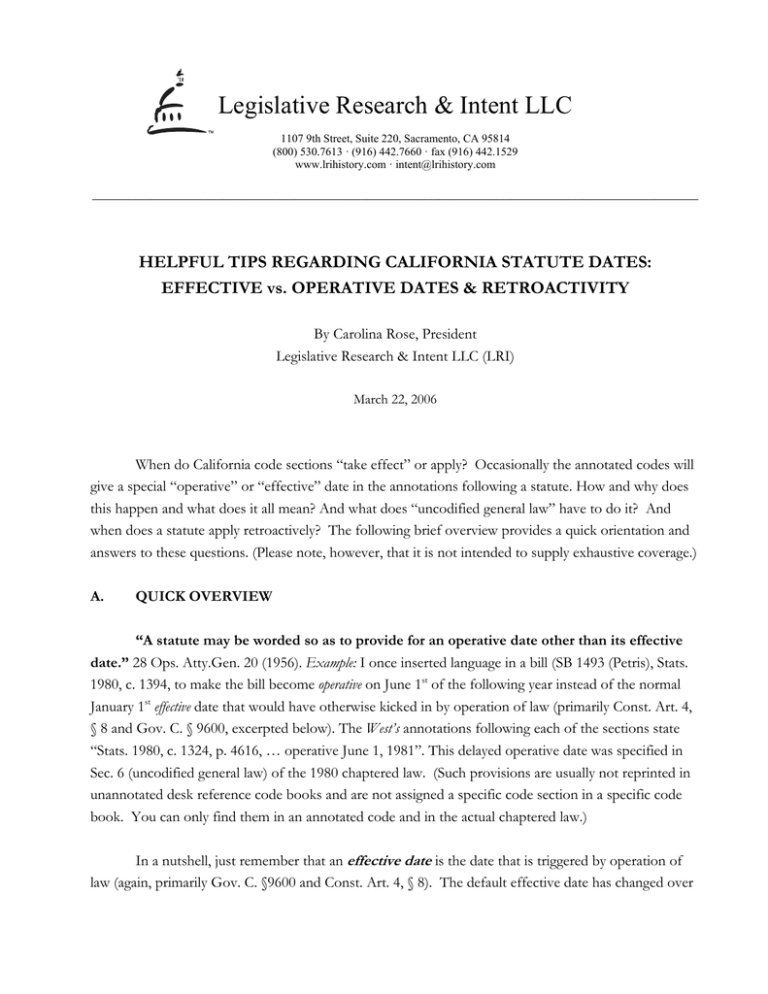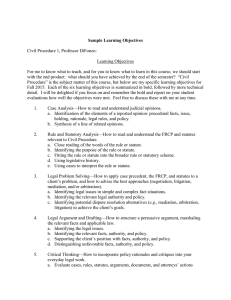Statute Dates - Legislative Research
advertisement

Legislative Research & Intent LLC 1107 9th Street, Suite 220, Sacramento, CA 95814 (800) 530.7613 · (916) 442.7660 · fax (916) 442.1529 www.lrihistory.com · intent@lrihistory.com ____________________________________________________________________________________ HELPFUL TIPS REGARDING CALIFORNIA STATUTE DATES: EFFECTIVE vs. OPERATIVE DATES & RETROACTIVITY By Carolina Rose, President Legislative Research & Intent LLC (LRI) March 22, 2006 When do California code sections “take effect” or apply? Occasionally the annotated codes will give a special “operative” or “effective” date in the annotations following a statute. How and why does this happen and what does it all mean? And what does “uncodified general law” have to do it? And when does a statute apply retroactively? The following brief overview provides a quick orientation and answers to these questions. (Please note, however, that it is not intended to supply exhaustive coverage.) A. QUICK OVERVIEW “A statute may be worded so as to provide for an operative date other than its effective date.” 28 Ops. Atty.Gen. 20 (1956). Example: I once inserted language in a bill (SB 1493 (Petris), Stats. 1980, c. 1394, to make the bill become operative on June 1st of the following year instead of the normal January 1st effective date that would have otherwise kicked in by operation of law (primarily Const. Art. 4, § 8 and Gov. C. § 9600, excerpted below). The West’s annotations following each of the sections state “Stats. 1980, c. 1324, p. 4616, … operative June 1, 1981”. This delayed operative date was specified in Sec. 6 (uncodified general law) of the 1980 chaptered law. (Such provisions are usually not reprinted in unannotated desk reference code books and are not assigned a specific code section in a specific code book. You can only find them in an annotated code and in the actual chaptered law.) In a nutshell, just remember that an effective date is the date that is triggered by operation of law (again, primarily Gov. C. §9600 and Const. Art. 4, § 8). The default effective date has changed over time, depending upon the year of enactment and whether it was enacted during a regular session or special session. West’s Annotated Codes publishes an excellent table showing all the default effective dates from 1955 forward. (Pre-1955 information will require its own future tip sheet.) You can find this handy West’s table in the pocket supplements of the first volume of every code series. Most often the effective date is the following January 1 for regular session statutes enacted after the 1972 regular session. This is true unless one of the other dates applies by operation of law (e.g., tax levies take effect upon approval by the Governor or it was a special session bill, etc.) and unless an alternative effective date applies for bills that were passed from 1955 – 1972 per the above described, handy West’s table. However, an alternative operative date overrides the constitutional and statutory default because it is designated in the relevant chaptered law. Such designations often appear in uncodified, general law sections of the relevant chaptered law and are not assigned a code book and section number. These rather ghostly provisions are still the law even though they do not appear as a separate code section of an assigned code book and are usually set forth in the annotations following the code section of interest. (This is a good reason to be wary of unannotated desk sets.) Other things to consider: • Silence regarding effective or operative date. In general, if the Stat. [year], c. [number] annotation following the statute is silent with respect to an “operative” or “effective” date, then the default effective date is the subsequent January 1st for post 1972 acts. “Effective” dates are most often given whenever the January 1st date does not apply (e.g., by law (excerpted below) urgency bills take effect immediately upon approval by the Governor, etc.). • Don’t be confused by the earlier date that an act was “approved” by the Governor. These dates show up in the chaptered laws at the end of the act’s title. Sometimes you will find that the “approval” date is the same as the effective or operative date – but only after jumping through the appropriate analytical tools that I’ve attempted to summarize here. Most often the date that the governor approved a bill has nothing to do with when the statute takes effective or is operative. • Retroactivity can be specified in the terms of the statute itself or implied from uncodified general law provisions in the chaptered law which state that the act is “declaratory of existing law and does not constitute a change in existing law.” (Again, unannotated codes do not provide these ghostly uncodified general law provisions.) The argument can be made that the associated statute was intended to apply retroactively since it was merely restating or clarifying the existing law. I have personally inserted such language in bills I was responsible for with the specific intent of triggering retroactivity. Lastly, strictly procedural versus substantive statutory changes have been applied retroactively. (The case the law development here is substantial and not summarized in this brief paper.) B. THE PRIMARY GOVERNING LAW (in effect March, 2006) (a) Constitution Art. 4, Sec. 8, subdiv. (c) (as last amended eff. June 6, 1990): (c) (1) Except as provided in paragraphs (2) and (3) of this subdivision, a statute enacted at a regular session shall go into effect on January 1 next following a 90-day period from the date of enactment of the statute and a statute enacted at a special session shall go into effect on the 91st day after adjournment of the special session at which the bill was passed. (2) A statute, other than a statute establishing or changing boundaries of any legislative, congressional, or other election district, enacted by a bill passed by the Legislature on or before the date the Legislature adjourns for a joint recess to reconvene in the second calendar year of the biennium of the legislative session, and in the possession of the Governor after that date, shall go into effect on January 1 next following the enactment date of the statute unless, before January 1, a copy of a referendum petition affecting the statute is submitted to the Attorney General pursuant to subdivision (d) of Section 10 of Article II, in which event the statute shall go into effect on the 91st day after the enactment date unless the petition has been presented to the Secretary of State pursuant to subdivision (b) of Section 9 of Article II. (3) Statutes calling elections, statutes providing for tax levies or appropriations for the usual current expenses of the State, and urgency statutes shall go into effect immediately upon their enactment. (b) Government Code § 9600 (as last amended by Stats. 1973, c. 7, Sec. 17): (a) Except as provided in subdivision (b), a statute enacted at a regular session shall go into effect on January 1 next following a 90-day period from the date of enactment of the statute and a statute enacted at a special session shall go into effect on the 91st day after adjournment of the special session at which the bill was passed. (b) Statutes calling elections, statutes providing for tax levies or appropriations for the usual current expenses of the state, and urgency shall go into effect immediately upon their enactment. (c) Government Code § 17580 (as added by Stats. 1988, c. 1179, Sec. 4): No bill, except a bill containing an urgency clause, introduced or amended on or after January 1, 1989,that mandates a new program or higher level of service requiring reimbursement of local agencies or school districts pursuant to Section 6 of Article XIII B of the California Constitution shall become operative until the July 1 following the date of on which the bill takes effect, unless the bill specifically makes this section inapplicable or contains an appropriation for the reimbursement or a specification that reimbursement be made pursuant to Section 17610. (d) Regarding initiatives and referendums, see Const. Art. 2, § 10 (statutes) and Const. Art. 18, §4 (constitutional amendments or revisions).


